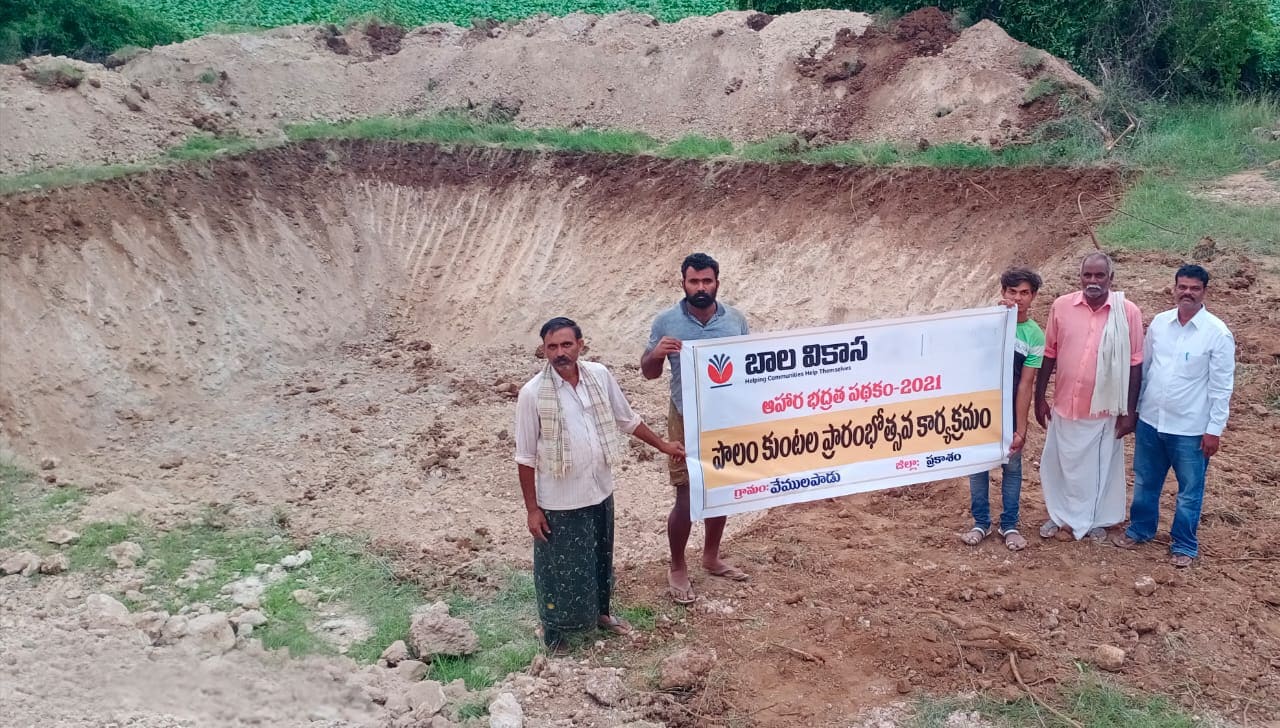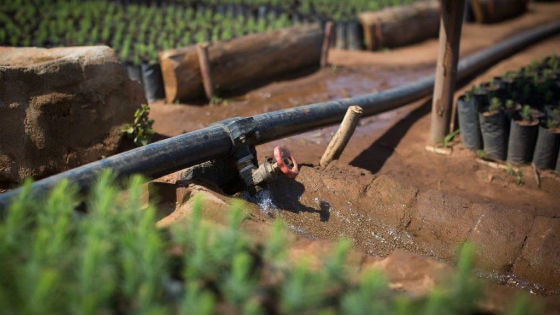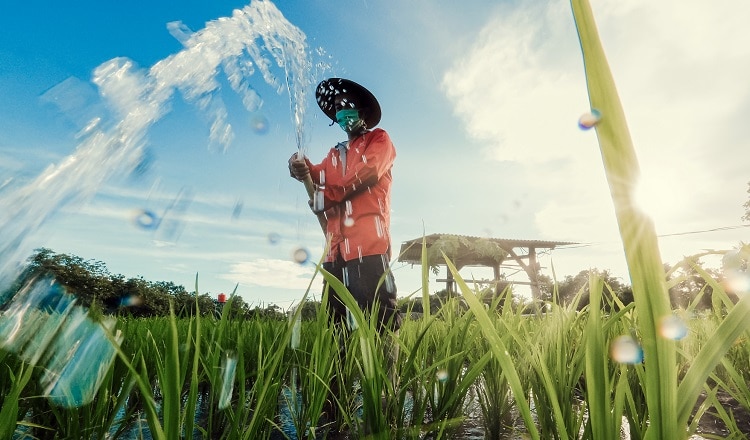Philip Morris International (PMI) is working to act as a steward for water, and this is based on our bold ambition to scale solutions toward a positive impact on stressed water resources by 2033.
As of 2023, our water stewardship efforts have contributed to optimizing a total of 8.1 million cubic meters of water in our tobacco-growing areas since 2019, putting us well on track to achieving our aspiration to optimize 25 million cubic meters of water by 2033.
In India, we have been working with our affiliate, leaf suppliers, and NGOs to drive a sustainable water management program that supports tobacco farmers in the drought-prone regions of Andhra Pradesh. This multi-phase initiative has helped small-scale farmers—who rely primarily on rain-fed agriculture—expand their irrigation options by constructing farm ponds that can serve as small-scale reservoirs in areas such as Giddaluru and Vinukonda.
“Given the high seasonal variability of rainfall, it’s sensible to provide water and farm pond training to farmers,” said Anselma Faustina, Manager Leaf Sustainability at PMI. “That way, we can anticipate and mitigate competing demands for water and ensure the tobacco farmers have enough for irrigation.”
PMI and NGO staff and farmers during the excavation of a farm pond.
Phase one: Building awareness
In July 2021, the initiative’s first phase set out to build awareness of sustainable water conservation within the community and enhance access to irrigation.
Village-wide orientation meetings introduced over 76 tobacco farmers in areas such as Rajupalem and Basavapalli to the concept and benefits of farm ponds, capturing rainwater during the monsoon season for use in drier months, and addressing water scarcity issues that had previously limited crop growth.
Following these meetings, on-site assessments helped identify fields with areas suitable for pond construction. Each selected farmer offered their own land and labor, illustrating their commitment to the project’s goals.
“With the check dams and farm ponds we’ve built, we’re finally able to store enough water to recharge our borewells and keep our fields irrigated,” one farmer told the team. “Now, when we need it most, we have enough water to keep our crops alive for two to three days straight. It’s a relief to know our hard work won’t dry up.”
With the support of locally sourced machinery, 76 farm ponds had been excavated and fenced by mid-2022, contributing to almost 19,000 cubic meters of volumetric water benefit (the volume that results from these water stewardships activities).
This phase not only provided immediate irrigation solutions for individual farmers, but also allowed them to plan future crops with greater confidence that they would have water to irrigate them.
Phase two: Growing momentum
Impressed by the engagement and success achieved in the first phase, we approved a second phase in July 2022, allowing farm ponds to benefit more farmers across the region. Orientation sessions in additional villages, including Vemulapadu and Devanagaram, helped establish 50 farm ponds, yielding over 1,500 cubic meters of volumetric water benefit.
A woman leads a training course on water saving techniques for farmers in India.
Practical, hands-on training became a focal point during this phase. On July 12, 2022, a comprehensive training session brought farmers together to learn techniques for rainwater diversion, pond maintenance, and the management of bunds (earth embankments surrounding each pond)—which can together help increase the durability and water retention of the ponds.
To maintain transparency and bolster local pride in the project, banners and iron name boards were set up at each pond site, emphasizing community involvement and encouraging neighboring farmers to participate.
Phase three: Meeting drought challenges head on
Responding to the high seasonal variability continuing to impact Andhra Pradesh—particularly in Prakasam, Palnadu, and western Guntur—the project’s scope was expanded once again in 2023.
With water shortages threatening farmers’ livelihoods, we worked with a local organization with experience in the area to add 15 more ponds with a capacity of 432 cubic meters each, yielding a volumetric water benefit of over 4,000 cubic meters.
Using GPS technology, project coordinators ensured that each pond was strategically placed in areas with the highest rainwater catchment potential.
Ensuring safety, security, and success
Safety was integrated into the design of each pond, reflecting the project’s commitment to community well-being.
For each of the phase three ponds, a sturdy fence was installed using concrete poles and durable mesh to protect both locals and livestock. This fencing was also added to 10 of the ponds created during the first phase.
A farm pond in India with a fence to prevent trespassing and protect livestock.
In addition to physical infrastructure, the project’s success has been rooted in the skills and knowledge shared with local farmers, with training on pond maintenance and irrigation practices a critical element.
For example, in November 2023, a workshop led by experts from our partner organizations gathered the 15 farmers from the third phase to build expertise on effective water conservation strategies, bund care, and techniques for sharing resources with neighboring farmers.
This training was designed not only to empower farmers with practical knowledge, but also to foster a cooperative mindset within the community. Farmers learned about collaborative water management practices, helping them to strengthen ties while reducing reliance on external resources.
A lasting impact on rural water security
Since its inception, our farm pond initiative has dramatically improved irrigation access and resilience during the dry season for farmers in Andhra Pradesh.
Over the span of three years, the initiative successfully established a total of 141 ponds. It has enabled local farmers to manage and maintain these ponds, enhancing their ability to irrigate fields during water-scarce periods.
This capability not only reduces the risk of losing crops but also supports agricultural productivity in a region where farming is the cornerstone of livelihoods.
To date, we have implemented water stewardship initiatives in eight countries: Argentina, Brazil, Italy, Malawi, Mozambique, Pakistan, Turkey, and the above example in India.
“This farm ponds initiative is a cross-pillar effort aimed at promoting environmental sustainability and improving crop practices,” said Wilson, PMI’s Head of Leaf, Asia. “Through extensive collaboration with leaf suppliers, local NGOs, and tobacco farmers, we are preserving the rainwater harvesting practice, while ensuring the farmers have sufficient water for their crop irrigation.”






